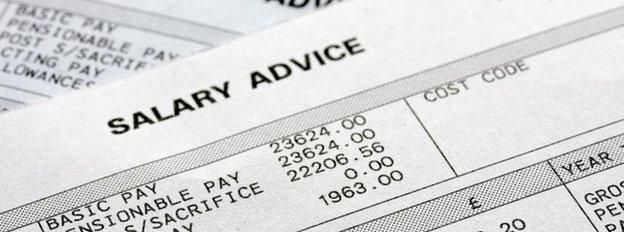Budget 2015: What it means for you
- Published
Take a tour of 'Budget town'
This Budget is "bold in building the aspirations of working people", according to Chancellor George Osborne.
Yet, at its heart is a plan to cut £12bn from the welfare bill - a move that will affect the lives of millions of people.
To Mr Osborne's supporters, this Budget is a seminal moment in a shift from reliance on the state to rewarding hard work, particularly with a new pay guarantee.
To his critics, it is a hammer blow to the financial lives of struggling families across the country.
But what - in practical terms - does it mean for you?

Which are the deepest cuts?

As predicted, there will be big changes to the system of tax credits.
Only the lowest-income families will be able to claim tax credits. Together with changes to entitlement to Universal Credit, this will cut £2.9bn from the welfare bill in the next financial year and £3.4bn a year by 2020-21.
For example, the income threshold for tax credits is to be reduced from £6,420 to £3,850. So, from April 2016, anyone earning more than £3,850 a year will have their Working Tax Credit reduced more steeply.
Larger families, particularly, will be hit by tax credit changes if they have children from April 2017.
Claimants will see child tax credits and Universal Credit limited to the first two children.
Here is some context: at present about 870,000 families claiming tax credits have three or more children - about one in five families receiving tax credit. However, it will only be those larger families making a claim, or having more children, from April 2017 that will be affected.

In addition, many working age benefits will be frozen for four years, such as tax credits and local housing allowance, but excluding maternity pay and disability benefits. This is a cut to the welfare bill of £4bn a year by 2020-21.
The benefits cap - the maximum amount a household can receive in benefits - will be reduced. For those living outside of London it will drop to £20,000. For those living in London, where housing costs are higher, the cap will be £23,000.

I rent out a home, what are the big changes in this area?

Landlords are going to take a big hit, but not immediately.
Tax relief on mortgage interest payments on residential property will be restricted to the basic rate of tax. This will be phased in over four years from April 2017.
This means that landlords, who get a tax break by using mortgage interest to reduce their taxable profits, will have less opportunity to do so.
Landlords in London, where rents and property prices are highest, are likely to be hit the hardest.
The share prices of house builders have taken an immediate hit, partly because a number of homes may be put onto the market by reluctant landlords following the chancellor's announcement.
In other housing announcements, rents in the social housing sector will be reduced by 1% a year for the next four years. However, housing association tenants in England who earn more than £30,000 per household - or £40,000 in London - will have to pay up to the market rent.
Housing benefit will not be paid automatically to 18 to 21-year-olds.
Insuring a home will get more expensive, by an average of £9.48 a year, as a result of changes to insurance premium tax.

Budget in depth

What about my pay?

Currently there is a 1% cap on rises in public sector pay. The chancellor said this would be held at a 1% rise for the next four years.
Although this is faster than the rising cost of living at the moment, this measure is expected to mean a cut in real terms over the course of the four years. The Bank of England's target for inflation, which charts the rising cost of living, is 2%.
But there was a huge rabbit that Mr Osborne pulled out of his hat after an hour of his speech.
He announced a compulsory Living Wage - basically, a new minimum wage - paid to people aged 25 and over, starting in April 2016 at £7.20 an hour and reaching £9 an hour by 2020.
The current national minimum wage, we already know, will increase by 20p an hour to £6.70 from October. The hourly rate for younger workers will also rise, and for apprentices it will go up by 20% - or 57p - to £3.30 an hour.
A lot of directors of small companies take a small salary and pay themselves a much larger amount in dividends from shares in the company. The chancellor will increase the tax on all dividends above a new tax-free threshold of £5,000.
The most striking will be a 32.5% tax charge, instead of 25%, for those paying higher rate tax. Overall this is expected to raise an extra £2.5bn for the Treasury in 2016-17 and similar amounts in subsequent years.

And what about the tax I pay on my wages?
The Conservatives have promised that most people will not pay income tax on their first £12,500 of income by the end of this Parliament.
Mr Osborne was already moving towards this, with the allowance due to rise to £10,800 in 2016-17. However, he has now said that the first £11,000 of income will be free from tax from April 2016.
The point at which taxpayers pay higher rate tax of 40% on their income will increase to £43,000 from April.
This is the first step on the road to delivering his promise that, by 2020-21, nobody earning less than £50,000 will pay higher rate tax.

Can I leave my home to my children tax-free?

In the build-up to the general election, there were promises about making inheritance tax less of a burden on families.
A family home allowance of £175,000 in inheritance tax means that a married couple or civil partners can potentially leave property worth up to £1m to their children without an inheritance tax charge. The change will take effect in stages beginning with a family home allowance of £100,000 in April 2017 and reaching £175,000 by April 2020.
However, families will want more detail on exactly how this works, especially given that those who downsize in later life will get some credit in terms of inheritance tax for doing so.
There is an added complication in these calculations for those in some of the largest homes, or those owning in expensive areas. Over time, the allowance will gradually be taken away from those with estates worth more than £2m.

I received a grant in my student days, will it be the same for my children?

Students going to university from some of the worst-off families have been getting a maintenance grant.
This will be scrapped in England and Wales and replaced by loans for new students from the 2016-17 academic year.
These loans will be paid back once they earn more than £21,000. The maximum loan available will be increased to £8,200.

Were there any announcements affecting motorists?
Yes, anyone buying a new car from 2017 will have to pay attention to new Vehicle Excise Duty bands.
This means that the buyers of most new cars will pay a standard charge of £140. People who own cars now will see no change to this duty on their current vehicles.
The chancellor's previously announced plan to freeze fuel duty will remain in place.
The average annual comprehensive motor insurance policy will be £12.25 more expensive, owing to changes to insurance premium tax, according to the Association of British Insurers.

What did we know already?
In previous Budgets and Autumn Statements, the chancellor has outlined plans for the coming years including:
A tax-free personal savings allowance, external to apply to the first £1,000 of interest earned on savings for basic rate taxpayers, and the first £500 for higher rate taxpayers from April 2016
A Help to Buy Individual Savings Account will launch in the autumn, through which the government will top up by £50 every £200 saved for a deposit to buy a home up to a top-up limit of £3,000
The amount that can be saved in a pension free of tax over the course of a lifetime will fall from £1.25m to £1m from April 2016